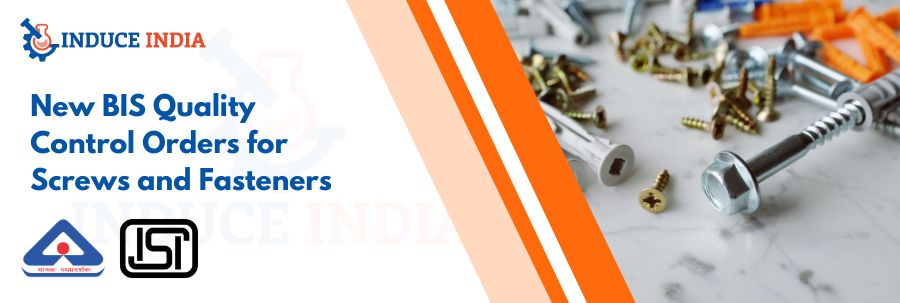The Ministry of Commerce and Industry has issued a Quality Control Order mandating that Bolts, Nuts, and Fasteners must comply with the following Indian Standards: IS 1363 (Part 1):2019, IS 1363 (Part 2):2018, IS 1363 (Part 3):2018, IS 1364 (Part 1):2018, IS 1364 (Part 2):2018, IS 4621:1975, IS 5187:1972, IS 10238:2001, IS 12427:2001, IS 3757:1985, IS 204 (Part 2):1992, IS 204 (Part 1):1991, IS 2681:1993, IS 281:2009, IS 7534:1985, IS 1284:1975, IS 15833:2009, and IS 6623:2004.
Products covered under this order must bear the Standard Mark and be manufactured under a valid BIS license, in accordance with Scheme I of the Bureau of Indian Standards (Conformity Assessment) Regulations, 2018.
Like many industrial goods, screws and fasteners are being regulated through Quality Control Orders. New rules have been issued by the Indian government to increase the quality requirements for screws and fasteners sold across the country. The Bureau of Indian Standards (BIS) runs these QCOs. The objective is to make sure that every fastener used in industries such as construction, automotive, and electronics conforms to safety and quality specifications.
Here is a brief description of what these orders mean, the affected persons, and what Indian businesses can do to prepare.
The Indian government, under section 16 of the Bureau of Indian Standards (BIS) Act, 2016, has issued a new regulation titled the Cross Recessed Screws (Quality Control) Order, 2024.
| SI. No. | Goods or Articles | Indian Standard | Title of Indian Standard |
| 1 | Cross Recessed Screws | 18471 (Part 1) : 2023 / ISO 15481:1999 | Fasteners – Cross Recessed Drilling Screws with Tapping Screw Thread Part 1 Pan Head |
| 2 | 18471 (Part 2) : 2023 / ISO 15482:1999 | Fasteners – Cross Recessed Drilling Screws with Tapping Screw Thread Part 2 Countersunk Head | |
| 3 | 18471 (Part 3) : 2023 / ISO 15483:1999 | Fasteners – Cross Recessed Drilling Screws with Tapping Screw Thread Part 3 Raised Countersunk Head | |
| 4 | 18476 : 2023 / ISO 15480:2019 | Fasteners – Hexagon Washer Head Drilling Screws with Tapping Screw Thread | |
| 5 | 18480 (Part 1) : 2023 / ISO 7049:2011 | Cross Recessed Tapping Screws: Part 1 Pan Head | |
| 6 | 18480 (Part 2) : 2023 / ISO 7050:2011 | Cross Recessed Tapping Screws Part 2 Countersunk Flat Head | |
| 7 | 18480 (Part 3) : 2023 / ISO 7051:2011 | Cross Recessed Tapping Screw Part 3 Raised Countersunk Oval Head | |
| 8 | 7483 : 2018 / ISO 7045:2011 | Pan Head Screws With Type H or Type Z Cross Recess – Product Grade A | |
| 9 | 7485 (Part 1) : 2018 / ISO 7046-1:2011 | Countersunk Flat Head Screws (Common head Style) With Type H or Type Z Cross Recess – Product Grade A Part 1 Steel Screws of Property Class 4.8 | |
| 10 | 7485 (Part 2) : 2018 / ISO 7046-2:2011 | Countersunk flat head screws (common head style) with type H or Type Z Cross Recess – Product Grade A part 2 Steel Screws of Property Class 8.8, Stainless Steel Screws and Non-Ferrous Metal Screws | |
| 11 | 7486 : 2018 / ISO 7047:2011 | Raised countersunk head screws (Common Head Style) with type H or type Z cross recess – Product grade A | |
| 12 | 18507 : 2024 | Drywall Screws – Specification | |
| 13 | 18508 : 2024 | Chipboard Screws – Specification | |
| 14 | 18509 : 2023 | Cross-recessed Countersunk Head Wood Screws – Specification |
What Are Quality Control Orders (QCOs)?
Quality Control Orders are issued by the government to ensure that certain items fall in with quality standards set by the Bureau of Indian Standards (BIS). For any product under QCO, it is mandatory that it bears the BIS Standard Mark in order to be legally manufactured, sold, or imported in India. This insignia is proof that it meets the requirements of safety and quality.
For screws and fasteners, QCOs require manufacturers to comply with laid down standards in terms of design, materials, testing, and durability. Thus, uniform standards for all fasteners in terms of quality and safety are maintained in the marketplace.
What Products Are Covered By These Regulations?
The new QCOs cover many fasteners widely known-and-coming screws, bolts, nuts, and threading. These include cross-recessed screws, hex bolts, flat head screws, and self-drilling screws. Each product is mandated to meet the relevant Indian Standards specifying requirements for its manufacture and testing. These regulations seek to prohibit the use of poor quality fasteners in the Indian market, especially those that may once have been imported or without due checks.
Who Has to Follow These Rules?
These rules apply to every business in India undertaking manufacturing, selling, importing, and storing screws or fasteners. The government is implementing these rules in phases for the ease of doing business. Large organizations shall comply by 20 March 2025. The deadline for small organizations is 20 June 2025 and that for microorganizations is 20 September 2025. This phased implementation affords smaller companies time for preparation without exerting much pressure.
Are There Any Exceptions?
Yes, some businesses and certain products are beyond the purview of this Act. Fasteners exclusively meant for export do not require certification from BIS. If the fastener comes as part of a fully assembled product being imported, it is exempt as well.
Very small businesses registered on the Udyam portal with turnover and investment below certain limits are spared from compliance. Furthermore, imports of up to 200 kg fasteners per annum for use in research and development work may also be carried out without a need for certification. These exemptions are included to ease the entry of. small and innovative ventures into the market.
Why it Matters
Having BIS certification raises the quality of fasteners in the market. It assures safety, especially in those industries where fasteners are used to hold critical parts together. This, in effect, promotes the Make in India initiative, thereby encouraging local manufacturing of quality products over substandard imports.
For a manufacturer, the certified mark can act as a branding tool for marketing within India as well as abroad.
Challenges for Businesses
Some companies may have some trouble with the certification due to the requirements of time and money for BIS certification. Small manufacturers may have to upgrade equipment or testing procedures, incurring high expenses possible. The process also takes time to be certified, and a delay in production or sales may arise if this is not adequately planned.
How to Prepare for these Rules
To prepare their businesses for these new rules, companies must find out if their products are covered under the QCO. Once that has been established, apply for BIS certification early on, as it can take some time. The companies should also ensure their factories and products adhere to the specified set of quality standards. Training will assist in ensuring staff are up to speed with BIS guidelines. If the company qualifies for an exemption, it should maintain a record to prove it, should it be required to do so in the future.
What happens when one does not follow the regulations?
Non-compliance with QCOs may lead to serious penalties. This includes a fine from ₹2 lakh and then higher depending on repeats. Not only that, one may also get arrested for up to two years in extreme cases. So, it is really important for the businesses to understand and observe the rules carefully.
Conclusion
Sliding down the interstate hill, new BIS Quality Control Orders for screws and fasteners are aimed at enhancing safety and product quality throughout India. And while some companies will meet with initial resistance, doing right by these laws will ultimately lead to better products and greater market trust. If they undertake some planning and timely action, businesses could be able to conform with the new parameters and become stronger in the long run.



